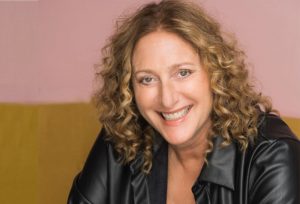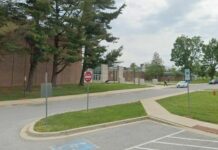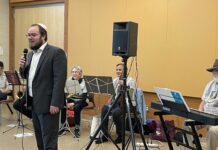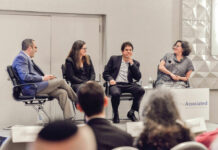
The Queer Jewish Arts Festival is returning to Baltimore for the third year this June.
This year’s festival will include a storytelling series, a performance by comedian Judy Gold and a gallery show.
June is Pride Month, a time where communities come together to celebrate the contributions LGBTQ people have made to history, society and culture. The month commemorates the Stonewall riots of June 1969, a turning point in recent LGBTQ history.
Event organizers Sara Shalva and Melissa Seltzer are excited for 2023’s festival, which will be their second year back in person. Shalva is the chief arts officer of the JCC of Greater Baltimore, and Seltzer is the senior director of arts and culture for the JCC of Greater Baltimore. Together, the pair worked with a committee of eight to put the festival together.
“There’s a celebration around identity in the Queer Jewish Arts Festival,” Seltzer said. “There are themes of coming home, of support and abundance, when people come out, and the joy of the arts, too.”
In addition to the celebratory aspects of the festival, the Queer Jewish Arts Festival is an opportunity for the community to examine its own potential biases, Shalva said.
“The arts are an opportunity to put a mirror up to a community, to understand who’s there and who’s not there, what voices are represented and which are silent,” Shalva said. “The Jewish community is beginning to do work around not everyone feeling like they belong, [examining] if we are living our Jewish values, [if we] are inviting everyone in.”
Inclusion is the theme of the festival, and organizers are doing everything they can to make sure community members who may feel marginalized are heard, according to Shalva.
The stoop storytelling series, which will take place on June 1 at 7:30 p.m., aims to celebrate identities, and organizers are seeking out people who identify as queer and Jewish to share a seven-minute, true, personal tale.
The decision to have the storytelling event downtown at the Creative Alliance was part of this initiative to broaden access to the festival’s events, according to Seltzer.
“You don’t have to be queer or Jewish to enjoy the festival,” Seltzer said.
The festival will also include a performance by stand-up comedian Gold, who was born in Newark, N.J. She’s won two Daytime Emmy Awards for her work as a writer and producer on “The Rosie O’Donnell Show.” Her performance will be held at The Gordon Center on June 22 at 7:30 p.m.
“Judy Gold is a hilarious comedian, and we want the whole community to be a part of the festival,” Seltzer said.
The gallery show will be held later this year, in September, at the Meyerhoff Gallery at The Gordon Center. Organizers hope that the gallery will offer artists the opportunity to create and display visual art at the intersection of their multiple identities, such as LGBTQ and Jewish. Works on paper, photographs, paintings and textiles are eligible for submission.
The choice to hold the majority of the events at The Gordon Center was also driven by a conscious effort for inclusion.
“It’s really important we’re doing this work with The Gordon at The Gordon,” Seltzer said. “We want to be seen as a place where everyone is welcome. We hear the community; we see the needs. We want people to know that they’re welcome, no matter their background or Jewish experience, that they are welcome at The Gordon Center.”
Shalva and Seltzer have high hopes for this year’s festival.
“My hope is that people will see themselves and feel heard and seen, that people will experience the stories and lives of others and change the way they see the world by learning more,” Seltzer said.
Seltzer related this hope to a piece of wisdom she once heard: “You can’t hate someone whose story you know.”
This quote is attributed to Margaret J. Wheatley, an American writer, speaker, teacher, community worker and consultant from Yonkers, N.Y.
Shalva hopes that, through this event, they will be able to build a community invested in the arts as a “platform and catalyst for social justice conversations” within the Jewish community and with the broader world.
“I feel like what it means to be a light unto the nations, or l’goyim, means shedding light in the dark places, and that can include our own communities — when we show up with bias or with discrimination. It’s saying, ‘Hey world, we’re not afraid of the dark places, we’re trying to bring light there also,’” Shalva said, explaining the importance of confronting bias within the community.
Tickets and information for each festival activity can be found at jcc.org/gordon-center/queer-jewish-arts-festival.







